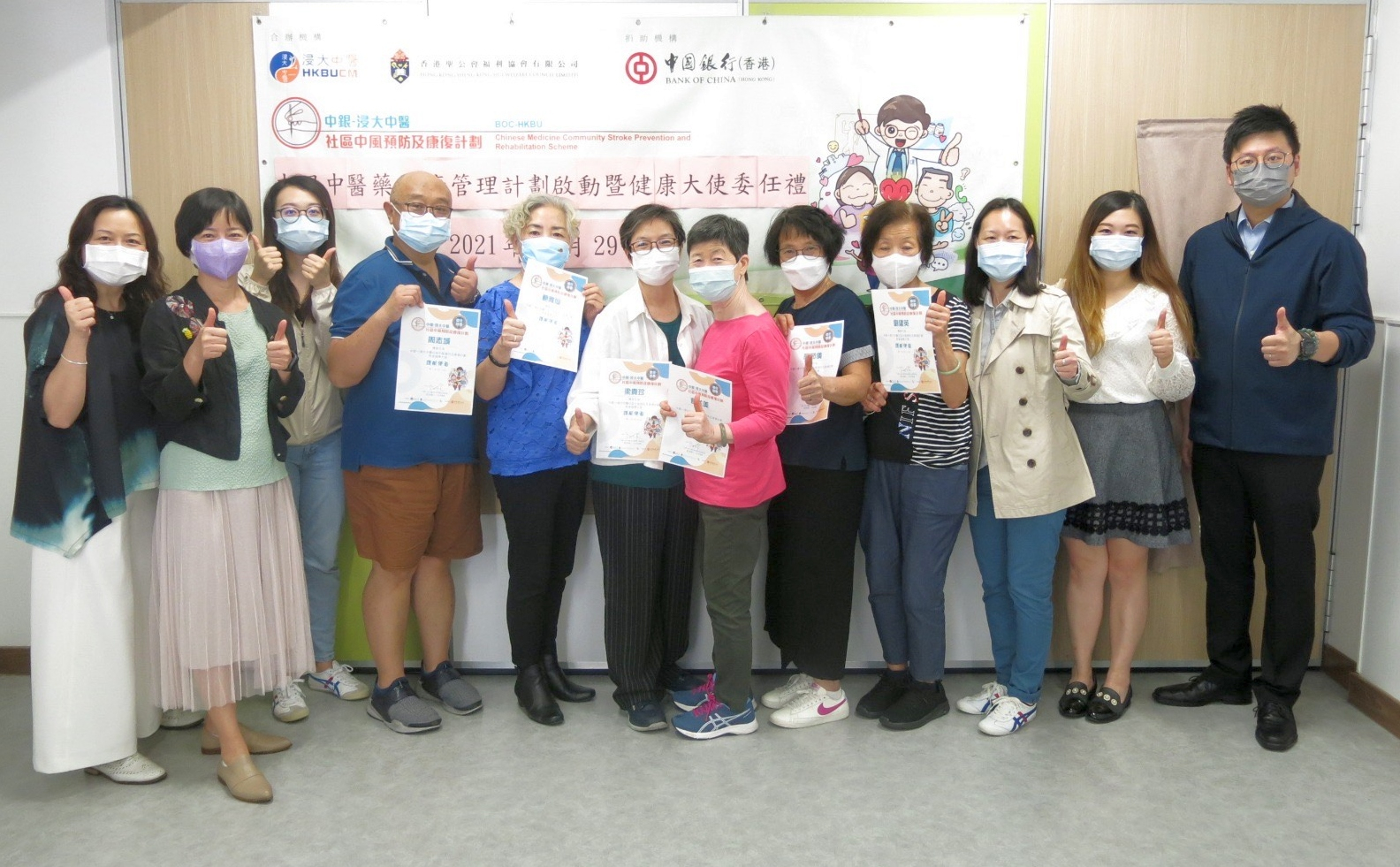Press Release
BOC–HKBU Chinese medicine community stroke prevention scheme appoints 167 ambassadors to assess older people's stroke risk
Sunday, 31 Oct 2021
The "BOC–HKBU Chinese Medicine Community Stroke Prevention and Rehabilitation Scheme", which was launched by Hong Kong Baptist University (HKBU) and the Hong Kong Sheng Kung Hui (HKSKH) Welfare Council, appointed 167 older people as the "Guardians of Stroke Prevention" at the health ambassadors appointment ceremony held on 29 October. The Scheme is supported by a donation from the Bank of China (Hong Kong), and the ambassadors will assess the risk of stroke for other senior citizens in the community and promote stroke prevention messages.
The ceremony was held at the HKSKH Lok Man Alice Kwok Integrated Service Centre. Older people from the 12 other HKSKH centres also joined the ceremony online.
Mr Cheung Chun-hoi, Assistant Professor of Practice of the School of Chinese Medicine at HKBU and Project Manager of the Scheme, said: "Training suitable older people to serve as 'Guardians of Stroke Prevention' can help them master the knowledge of stroke prevention and promote relevant messages. The Scheme also encourages senior citizens to keep learning and discover their personal potential, thereby setting a good example of community support, with senior citizens helping themselves as well as offering mutual aid to each other."
Ms Tai Lo-wing, Service Director of HKSKH Welfare Council Limited, said that the 13 elderly centres of the Council have recruited 167 older people to participate in the "Guardians of Stroke Prevention" training programme, which is organised by social workers with Chinese medicine practitioners as trainers. The content of the programme covers relevant stroke information, Chinese medicine dietary recommendations as well as acupoints and exercises for stroke prevention and therapy. After completing the training, participants will be able to use a soon-to-be-launched website on stroke prevention with Chinese medicine to assess the risk of stroke for other older people in the community.
The Guardians will fill in questionnaires for the older respondents in order to assess their individual risk of stroke. Those with a moderate to high risk of stroke will be referred to the Scheme to undergo a one-year preventive treatment programme and follow-up assessments. It is expected that around 1,200 older people will benefit from the Scheme.
Mr Yu, who has completed the training, said: "Knowledge acquired from the training classes, such as Chinese medicine dietary therapy, can be applied in daily life. I can now use the information to reduce the risk of stroke, and this will help my friends and other older people in my family."
Ms Chow, another appointed Guardian, said: "Apart from identifying people with a moderate to high risk of stroke in the community and encouraging them to take preventive measures, I was able to learn more about strokes."
From early next year, the public will be able to access the website on Chinese medicine stroke prevention, and it will provide information on Chinese medicine diets, exercises and related community resources. The website will also provide a questionnaire for the self-assessment of an individual's risk of stroke, and it aims to raise public awareness of stroke prevention measures and treatments.
The "BOC–HKBU Chinese Medicine Community Stroke Prevention and Rehabilitation Scheme" started in October 2020, and it will run until September 2023. In addition to the training of "Guardians of Stroke Prevention", it also provides stroke patients with a free six-month Chinese medicine treatment programme, which is offered by the Chinese medicine practitioners of HKBU's School of Chinese Medicine. Please click here for more information on the Scheme.
-End-

